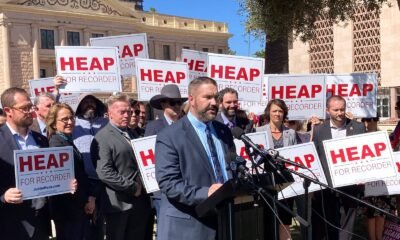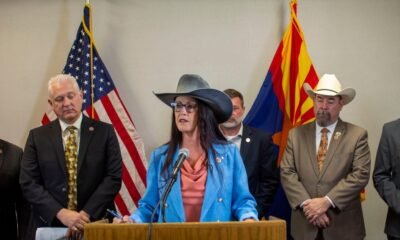Ann Scott Timmer
Arizona Supreme Court Dashes GOP’s Attempt to Overturn Efforts for Easier Voting and Registration

PHOENIX — The Arizona Supreme Court has declined to review a challenge by Gina Swoboda, the head of the Arizona Republican Party, to executive orders issued by Governor Katie Hobbs aimed at simplifying voter registration and voting processes. According to Chief Justice Ann Scott Timmer, Swoboda’s complaints should be addressed in a trial court, emphasizing that bypassing the standard litigation process in favor of direct appeal to the high court is unwarranted.
In a pointed critique, Justice Timmer remarked on the timing of the challenge, noting that the orders in question had been in effect since November 2023. “Petitioners have not addressed why neither executive order was challenged until this point in time,” she stated. An earlier challenge, she argued, could have ensured a final ruling well ahead of the upcoming general election.
As it stands, Hobbs’s two executive orders remain intact. One order mandates state agencies to link their websites to resources for voter registration, while also securing accessible locations for paper registration forms. The other order authorizes the use of state buildings for voting and ballot drop-off.
Attorney Andrew Gould, who represents Swoboda, contended that these measures exceed Hobbs’s powers under state law. He asserted that the responsibility for deciding polling and drop-off locations lies with the legislature, which is currently under Republican control.
Gould’s motion aimed to prevent Hobbs from enforcing her orders, while an attorney representing Hobbs clarified that state law does not inhibit agencies from providing voter registration services. Andrew Gaona highlighted the necessity of collaboration among counties to establish voting sites, countering Gould’s assertions of overreach.
Gaona refuted the claims of harm posed by increased access to voter registration, pointing out that similar initiatives had already been piloted without incident. He emphasized that the Supreme Court’s refusal to immediately consider the case was based on the lack of compelling justification for bypassing the normal legal process.
“This is not a ruling on the merits of the claims, but rather an affirmation of procedural integrity,” Timmer commented. The justices refrained from awarding legal fees to either party, leaving open the possibility for future discussions on such matters.
Prior to the Supreme Court filing, Gould sought the intervention of Attorney General Kris Mayes but received a dismissive response. Mayes questioned how enhancing access to registration and polling would be detrimental to anyone. A plea directed at Hobbs to retract her orders similarly went unanswered.
This ongoing legal conflict underscores the tensions surrounding voting regulations in Arizona as the state approaches a pivotal election cycle.


















